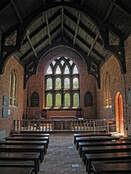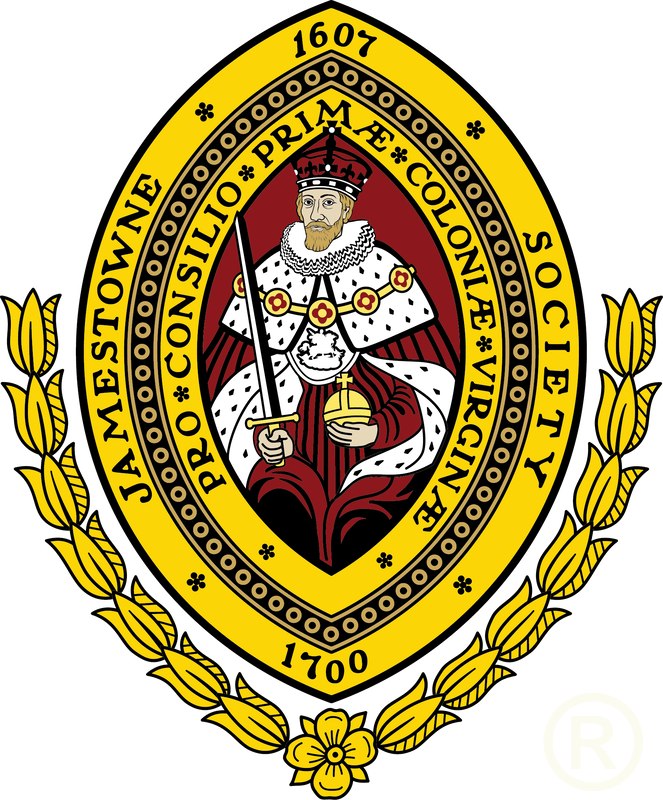 Memorial Church Interior, General Assembly Site Memorial Church Interior, General Assembly Site Eighteenth in a series of biographical sketches on Burgesses whose descendants belong to the First Mississippi Company; in honor of the 400th anniversary of the July 30, 1619, meeting of the first representative governmental body in America at the 1617 Church on Jamestown Island. Abraham Peirsey first arrived at Jamestowne aboard the Susan, the first Magazine ship sent to the Colony in 1616 from England. His wife, Elizabeth Draper and their two daughters, Elizabeth and Mary, arrived on the Southhampton in 1624. He later returned to England on the Susan and sailed back to Jamestowne aboard the George. Peirsey was Cape Merchant of the Virginia Company and a stockholder. In late August 1619, John Rolfe reported that the privateer White Lion landed “20. and odd Negroes…which the Governor and Cape Marchant [Peirsey] bought for victuals.” He also made a trading visit to Newfoundland in 1619 on the George to exchange tobacco for fish.
In 1624 Abraham Peirsey bought Governor Sir George Yeardley’s plantation known as Flowerdew Hundred, located on the south side of the James River just upstream from James City in present day Prince George County. Peirsey renamed the plantation Peirsey’s Hundred and built a stone house with the first permanent foundation in the colony. Flowerdew Hundred was a palisaded settlement which may account for there being only six deaths there during the Indian uprising in 1622. According to the 1624/25 Muster, Peirsey was the second wealthiest man in Virginia after Yeardley. Peirsey’s Hundred included twelve dwellings, three storehouses, four tobacco houses, and housed a total of 57 people, including 29 servants and seven Negroes belonging to Peirsey as indentured servants. The other residents were six married men with their families and servants, three single men, and a minister. In 1624, Peirsey also owned Windmill Point at which included the first windmill constructed in America. Ample supplies of food were on hand in the form of cattle, hogs, corn, peas, and quantities of fish. A continued concern over defense was reflected in the cannon, armor, gunpowder, and swords listed. On 24 Oct 1623, along with John Pory, John Harvey, John Jefferson and Samuel Mathews, Abraham Peirsey was appointed to a commission to "look into the state of Virginia." He was appointed to the Council 1624 and elected as Burgess in 1625. Peirsey’s plantation went to his second wife, Frances Greville, upon his death in 1627/1628. She later married Samuel Mathews and died in 1633. At her death the property was awarded to Peirsey’s daughter Mary Peirsey Hill. One of Mary's first act upon acquiring Peirsey’s Hundred was to rename it Flowerdew Hundred. In the five years that passed after Abraham's death the estate was altered so much that Mary became destitute. Today the plantation is held by the Flowerdew Hundred Foundation and is listed on Virginia’s Captain John Smith Chesapeake National Historic Trail, Civil War Overland Campaign Lee-Grant Trail, and the National Register of Historic Places. First Mississippi Company Descendant of Abraham Peirsey: Henry Hunter Jordan III
3 Comments
Victoria Baker
12/12/2019 08:43:28 am
Abraham piersey is my 16th great GPA
Reply
Duane Lenart
5/26/2023 12:35:24 pm
I am doing some genealogy for membership in the Jamestowne Society. Your article is very factual and I want to visit Flowerdew
Reply
Leave a Reply. |
To Our ContributorsWe welcome properly researched contributions of ancestor profiles, vignettes and comments from members that focus on their ancestors’ roles in Jamestown’s history, plus other aspects of their lives, events and experiences in the colony. PLEASE NOTE that all information must be documented and backed up by primary source documents, and not unverifiable information and family and urban legends. Submissions without this backup may be rejected. Please limit contributions and blog entries solely to the ancestors themselves, and do not include subsequent lineage information. Entries should be no more than 400 words. Archives
August 2022
Categories |

|
|
Donate |
- Home
- About Us
- Membership
- Resources
- Planned Giving
- Contact Us
- Shop
- Blog
-
Members Only Pages
-
Events
>
- Zoom Meetings
- Upcoming Events / Meetings
- Book Club Events
-
Past Events
>
- 2023 Heritage Week Dinner
- Spring 2018
- Fall 2017
- Spring 2017
- 2017 Heritage Week Luncheon
- Fall 2016
- Spring 2016
- 2016 Jamestowne Heritage Week Luncheon
- Fall 2015
- 2015 Jamestowne Heritage Week Luncheon
- Fall 2014
- Fall 2013
- Fall 2012
- Spring 2012
- Fall 2011
- Spring 2011
- Fall 2010
- Spring 2010
- Fall 2009
- Spring 2009
- Fall 2008
- Spring 2008
- Company Events
- Fall 2007
- 400th Anniversary Celebration
- More 400th Anniversary Photos
- Members Only Shop
-
Events
>
|
Contact us at
Jamestowne Society, Inc. 3901 Midlands Road Williamsburg, VA 23188-2575 804-353-1226 info@jamestowne.org |
This website is the property of the Jamestowne Society. Graphics and information may be copied or used ONLY for purposes of furthering the Society's goals.
|
© Jamestowne Society 2021
 RSS Feed
RSS Feed
